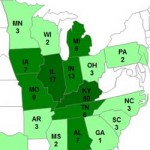The Kentucky public health lab has established that Salmonella found in cantaloupes grown on a farm in southwestern Indiana matches the strain that has sickened 141 people in a 20 state outbreak that has hospitalized 31 people and killed two, according to the Kentucky Department of Public Health. “This finding is ‘smoking gun’ evidence that cantaloupe from the Indiana farm caused this outbreak,” said Attorney Fred Pritzker, a national food safety lawyer who recently won $4.5 million for a client sickened in another outbreak.
The Salmonella deaths occurred in Kentucky where at least 50 people have been sickened since the beginning of July. Public health officials are investigating whether other clusters of Salmonella food poisoning cases in the state might also be part of the outbreak.
 “Foodborne illness is a serious threat to public health. Consumers are advised to avoid eating cantaloupes from southwestern Indiana, especially if they are at heightened risk for complications from salmonella infection,” acting Public Health Commissioner Steve Davis, M.D., said in a statement. “In addition, healthcare providers are encouraged to be mindful of patients who may have symptoms consistent with salmonellosis and report all cases to the local health department.” Kentucky public health officials are collaborating on an investigation of the outbreak with the Centers for Disease Control and Prevention (CDC), the U.S. Food and Drug Administration (FDA) and public health officials in other states that are part of the outbreak.
“Foodborne illness is a serious threat to public health. Consumers are advised to avoid eating cantaloupes from southwestern Indiana, especially if they are at heightened risk for complications from salmonella infection,” acting Public Health Commissioner Steve Davis, M.D., said in a statement. “In addition, healthcare providers are encouraged to be mindful of patients who may have symptoms consistent with salmonellosis and report all cases to the local health department.” Kentucky public health officials are collaborating on an investigation of the outbreak with the Centers for Disease Control and Prevention (CDC), the U.S. Food and Drug Administration (FDA) and public health officials in other states that are part of the outbreak.
Salmonella is a bacteria that can cause an infection called salmonellosis if it is ingested. These infections are diagnosed by culturing a stool sample. Symptoms of salmonellosis, which usually develop 12-72 hours after ingestion, include fever, diarrhea and abdominal cramps lasting four to seven days. When diarrhea is so sever that it causes dehydration, hospitalization is required. Cases where the bacteria migrates from the digestive tract to the bloodstream can be fatal if they are not treated promptly with antibiotics. Those most at risk are the elderly, young children, pregnant women and those with weakened immune systems. Health official encourage anyone with symptoms of salmonellosis to contact a healthcare provider.




